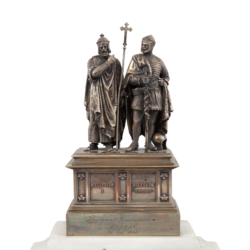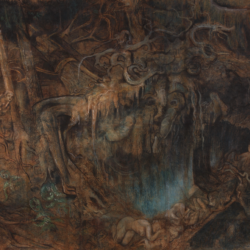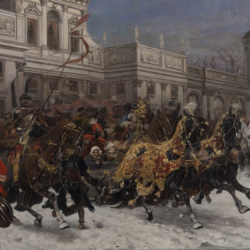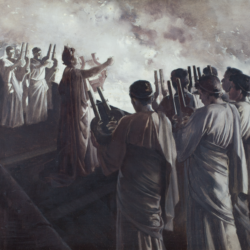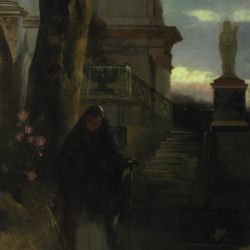
Political Theology – what is it?
The notion of “political theology” itself appears to be rather ambiguous. It suggests a sort of middle ground between theology and political science, a discipline that studies a theological vision of a transcendent or immanent order in relation to social and political realities. Carl Schmitt[1], a German jurist, constitutionalist and political theorist, who is commonly considered to be the patron of political theology, saw its primary goal to lie in uncovering the religious core of contemporary political and legal concepts. Presently, as a result of a post-secular turn in Western thought, the interaction between the visions of the eschaton and the realities of social life have also been examined by those thinkers who deny adherence to any specific religious tradition (e.g., Slavoj Žižek, Alain Badiou, Terry Eagleton, Giorgio Agamben)[2]. The post-secular political theology of today assumes that it is possible to consider the meaning of not only classical theological notions such as “God,” “sanctity” or “mystery,” but also other fields of imagery of the collective unconscious which shape social and political lives of entire communities.
The present paper mostly employs the concept of political theology as proposed by Eric Voegelin, a German-born Austrian and American philosopher[3]. In his works, Voegelin adopts a clear-cut definition of this branch of knowledge, which studies the transcendent order (or, the notion of the transcendent order) as it has interacted with social life and political realities throughout the ages. Like other political theologians, Voegelin assumes that such order – the subject of a scientific discipline – is not dependent on beliefs or imponderables of any religion, while its ideation (or experience) constitutes a solid foundation for all human societies. According to Voegelin, the transcendent nature of the order is its inalienable characteristic, while a certain interruption or suspension of transcendence and its partial or complete replacement with immanence, which occurred in the modern culture of the West, can be described more adequately as the “immanentization of transcendence”: approaching the everyday, sensual, carnal, and material aspects of the human condition as if they were elements of the eschatological more-than-human world.
It must be added here that, for Eric Voegelin, Slavoj Žižek, and Eric L. Santner alike, the theory of “political theology” – both as a scientific perspective for studying cultural phenomena and as the praxis that brings, preserves, or restores social order – requires transcendence to be absolute. In other words, transcendence needs to be a radically distinct order, whether founded on classical theologoumena and mythologems or on the total unknowability of the Unconscious. The dynamic nature of transcendence – or, if you prefer, the evolving process of exploring it – can thus never be successfully subjected to a reasoned analysis, though it itself constitutes the source of all rationality. Hence, the human sense or organ that allows for appreciating the order should be the human soul, cited by Voegelin, who in turn borrows this idea from Plato and the Pythagoreans. The soul is capable of experiencing and feeling; it seems to be “the feeling soul” in the sense suggested by Agata Bielik-Robson to substitute the notion of the post-Enlightenment “thinking subject,” or the “sensorium of transcendence” (the term often employed by Voegelin in reference to the psyche).
Therefore, when literature is analyzed from the perspective of political theology, it is not necessarily expected to represent rationality, sagacity, or a masterful selection of valid empirical insights. Even if works of literature have a quality that allows us to identify their potential for recognizing transcendent politeia paradigms, this does not mean that they have to display a specifically philosophical reflection which post-Enlightenment readers have come to see as a mark of valuable, high-brow literature. On the contrary, such writing may seduce the reader with its delightful style, the rhythm, and melody of narration; it encourages intuitive, artistic cognition. A strong connection between cognitive values of literary works (such as biblical poems, Homer’s and Hesiod’s epics, Greek tragedies, etc.) and their aesthetic beauty is built by Eric Voegelin, for example, in many different parts of his multi-volume Order and History.
Przypisy
- See C. Schmitt, Political Theology: Four Chapters on the Concept of Sovereignty, translated by G. Schwab, Chicago 2006; the German original was published in 1922.
- See e.g. S. Žižek, E. L. Santner, K. Reinhard, The Neighbor: Three Inquiries in Political Theology, Chicago 2006.
- The seminal works by Voegelin that have been published in Poland include selected volumes of his monumental series entitled Order and History.

